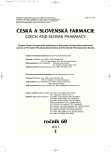-
Medical journals
- Career
Study of local anaesthetics – Part 194 Evaluation of carbopol hydrogels with lidocaine
Authors: Zuzana Vitková 1; Petra Herdová 1; Jozef Čižmárik 2; Marián Žabka 1; Bronislava Brázdovičová 1; Katarína Bočkajová 1
Authors‘ workplace: Univerzita Komenského Bratislava, Farmaceutická fakulta, Katedra galenickej farmácie 1; Univerzita Komenského Bratislava, Farmaceutická fakulta, Katedra farmaceutickej chémie 2
Published in: Čes. slov. Farm., 2011; 60, 79-83
Category: Original Articles
Overview
The objective of this article is to describe the formulation and evaluation of dermal semisolid drugs – carbopol hydrogels containing the solution of Bukofit, zinc chloride and the local anaestethic lidocaine. The hydrogels were evaluated after 2, 7, 14 and 28 days after their preparation and stored at the temperature of 5 °C ± 0.2 °C. All prepared hydrogels were found to be stable with respect to pH values and rheological parameters. It follows from the found rheological parameters and flow curves that all evaluated hydrogels belong to non-Newtonian thixotropic systems. The extensometric analyses revealed increased deformation values, indicating that the gels can be easily spread out over the mucous membrane which results in the increased ability of the drug to diffuse into it. Based on the results obtained, it can be concluded that the prepared hydrogels have appropriate technological parameters and therefore in the future they may become potential drugs for the treatment of various inflammations in the oral cavity.
Key words:
hydrogel – Bukofit – lidocaine – rheological parameters
Sources
1. Lehr, C. M.: Bioadhézia a bioadhezívne liekové formy. In: Žabka, M., Müller, R. H., Hildebrand, G. E.: Moderné lieky vo farmaceutickej technológií. 1. vyd. Bratislava: Slovak Academic Press 1999; 24, 35–44.
2. Jones, D. S. et al.:An examination of the rheological and mucoadhesive properties of poly (acrylic acid) organogels designed as platforms for local drug delivery to the oral cavity. J. Pharm. Sci. 2007; 96, 2632–2676.
3. Sule, A., Yilmaz, C., Atilla, H.: Physico chemical and bioadhesive properties of polyacrylic acid polymers. Pharmazie 1993; 48, 285–287.
4. Salamat-Miller, N., Chittang, M., Johnston, T.P.: The use of mucoadhesive polymers in buccal drug delivery. Advanced Drug Delivery Rev. 2005; 57, 1666–1691.
5. Ghaly, M.: Rheologycal study of phiroxicam. Bull. Fac. Pharm. 1996; 34, 41–43.
6. Santoyo, S., Ygartua, P.: Effect of skin pretreatment with fatty acids on percutaneous absorption and skin retention of piroxican after its topical application. Eur. J. Pharm. Biopharm. 2000; 50, 245–250.
7. Jacobs, C., Kayser, O., Muller, R. H.: Production and characterization of mucoadhesive nanosuspension for the formulation of buprevaquone. Int. J. Pharm. 2001; 214, 3–7.
8. Čižmárik, J., Matušová, D., Vitková, Z., Brázdovičová, B., Herdová, P.: Štúdium lokálnych anestetík. Časť: 192. Formulácia lidokaínu do gélov s protizápalovým účinkom. Čes. slov. Farm. 2010; 59, 277–279.
9. Vitková, Z., Herdová, P., Šubová, M., Šimunková, V.: Formulácia chlórhexidínu od hydrogélov. Čes. slov. Farm. 2009; 58, 116–118.
10. Kołodziejska, J.: Carbopol 974 in the prescription of dental antiinflamatory hydrogels. Polim. Med. 2008; 38, 27–38.
11. Kriška, M.: Memorix klinickej farmakológie liekov. Bratislava: Slovac academic Press 2006; 413–421, 441–445.
Labels
Pharmacy Clinical pharmacology
Article was published inCzech and Slovak Pharmacy

2011 Issue 2-
All articles in this issue
- Myasthenia gravis – current treatment standards and emerging drugs
- Pelletization of melts and liquids
- Dyer’s Greenweed (Genista tinctoria L.): constituents and biological activity
- Bacteriocins produced by lactic acid bacteria
- Generic substitution, replacement and substitution of drugs: contemporary extent
- Study of local anaesthetics – Part 194 Evaluation of carbopol hydrogels with lidocaine
- Analytical evaluation of mono[{3-[4-(2-etoxyetoxy)-benzoyloxy]-2-hydroxypropyl}-isopropyl-ammonium]fumarate
- Czech and Slovak Pharmacy
- Journal archive
- Current issue
- Online only
- About the journal
Most read in this issue- Generic substitution, replacement and substitution of drugs: contemporary extent
- Myasthenia gravis – current treatment standards and emerging drugs
- Bacteriocins produced by lactic acid bacteria
- Pelletization of melts and liquids
Login#ADS_BOTTOM_SCRIPTS#Forgotten passwordEnter the email address that you registered with. We will send you instructions on how to set a new password.
- Career

